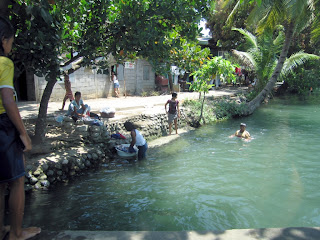
I very closely resemble my mom, and in turn she looks very much like her mother, my lola Elena who recently passed away. Lola Elena, now she was a tough cookie; she was known all her life as being something of a fishwife, and by that I mean no disrespect whatsoever, only an honest recognition of her nature. She did sell fish--making the long trek from the Malolos talipapa (wet market) all the way to Manila every day--and she did always have plenty to say. About nearly everything! Her attitude towards life was robust, forthright, and a broad streak of asperity colored all her dealings with others - her family and clan as well as friends and neighbors.
Palaban, ika nga. Walang pinangingimian. A very different kettle of fish from my lola Bebeng who was the soul of gentleness and discretion....Incidentally, my sister Vicky looks very like Lola B, from the long straight nose to the cast of the forehead, while I have Lola E's facial cast and shall we say very petite stature, as well as her ringing laughter. But I am more peaceable, like Lola B I think!! Whereas V is a war freak :-p
In any case both my lolas were women of admirable fortitude. These were people who survived World War II. When I was little, some of my worst dreams involved being caught in war, where I was always enveloped in a cloud of indefinable dread. My grandmothers lived through those times and flourished, eventually raising large broods: Each had seven children who survived to maturity.
Many ancient ones, when they pass on to the hereafter, leave heirlooms behind. While I have nothing material from either lola I like to think they left me and all their grandchildren and great-grandchildren something even better: personal grace and the sheer stubbornness that sometimes is the only thing that will see you through life's rough patches. To know that I am part inheritor of lives very richly lived--it's the best legacy ever. (Though a baul of vintage clothing wouldn't have come amiss. Joke!)










